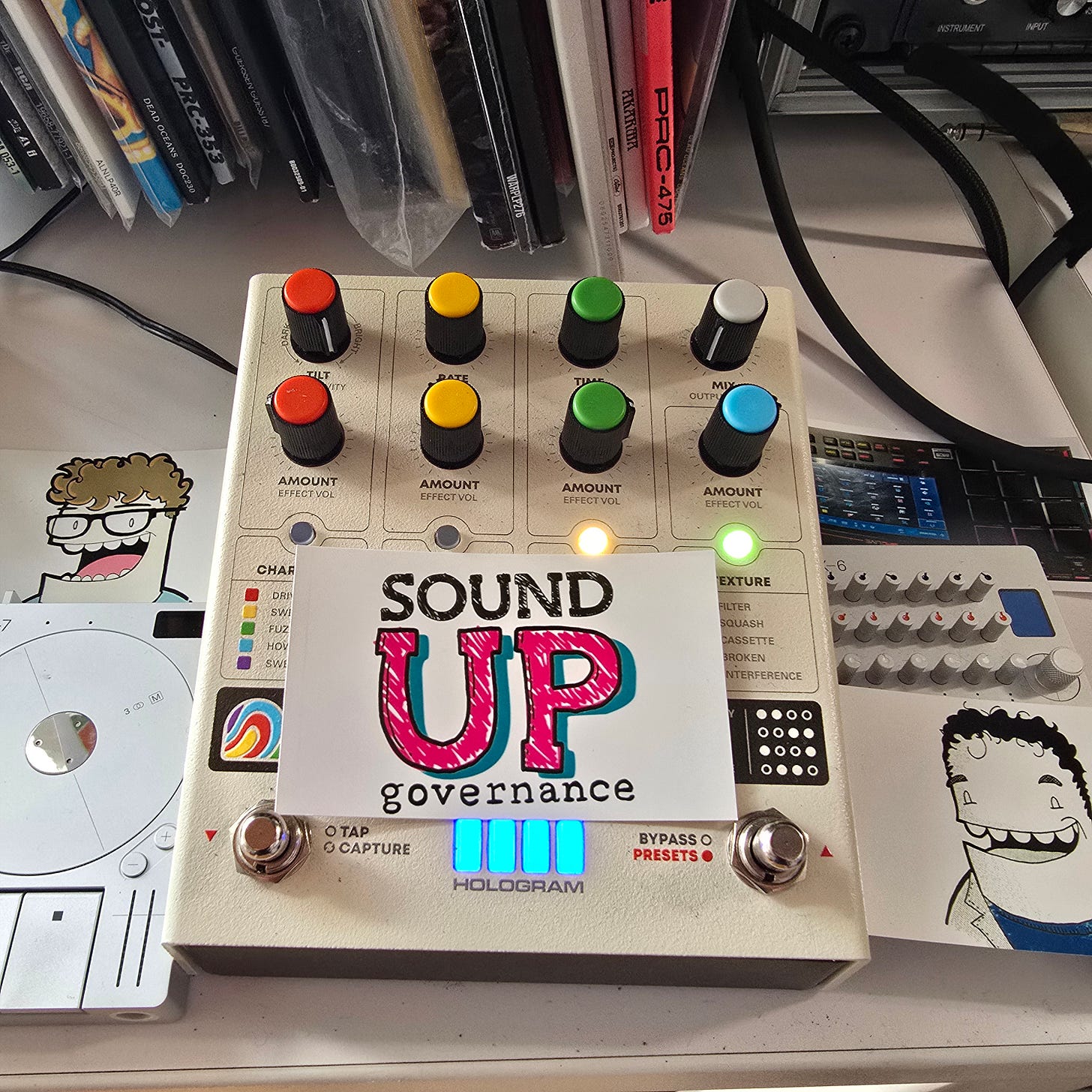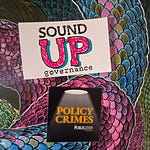TRANSCRIPT
Matt Voiceover: 00:00
Welcome back to Sound-Up Governance. My name is Matt Fullbrook, and this is the tenth and final episode in my epic conversation with my brilliant governance friend, Andrew Escobar. Today's episode is a bit longer than the others in this series because were working through some thinking on a really interesting topic. Between the board chair, the CEO, and the rest of the executive team, who should be deciding exactly what we talk about and how deep we dive and when? Is it possible that there ought, in fact, to be no clearly defined distinction between where the board ends and management begins? Andrew kind of makes that point today, and frankly, I'm pretty sure I agree all the way. Have a listen and let me know what you think.
Matt F: 01:02
It's been really hard for me to convince CEOs to have discipline around deciding specifically what conversations they hope to have at the meeting that's coming up and sharing that hope. What do you think it would take to make it more...to make it easier for boards and managers to feel comfortable saying, "hey, you know what? I really hope to...this is what I really want to talk with the board about at the next meeting, and here's what I'm doing to make that happen?" Or why is it uncomfortable?
Andrew Escobar: 01:43
Why is it uncomfortable for whom?
Matt F: 01:45
In my experience, the discomfort is usually on the CEO's part. But boards don't make it any easier.
Andrew Escobar: 01:53
I wonder if that discomfort is because they think that that time is exclusively or the balance of it is for the board and the directors, as opposed to everyone.
Matt F: 02:05
Okay.
Andrew Escobar: 02:06
And I do think it is. That's time for everyone. Even if the decision is. Even if the decisions are the board's, the time leading up to that decision, I think you need to get that balance right. And so I might want to. Of course, I approach regularly scheduled meetings with, a sense of what conversation do I want to have? Or what direction do I want this conversation to go? But I think I'm more interested in hearing from the team, and I do mean the team, maybe not the CEO specifically, the team, what they were hoping to get out of our time together. And you set an agenda and that sort of dictates the conversation, but not always. Can you be a bit explicit about it? I'd like to think that you have the comfort with a management team to say, "we really want you to bring us some direction here as well." Like, where did you want this to go? Like, if we wrapped today and we made a decision, but we hadn't touched on these particular aspects of the decision, would you be disappointed? Would you be, heck, Would you be angry? Would you be bummed out? What, what aspects do you not want us talking about as well? And like, it's not that I'm going to leave it off the table, but it's useful to know. And I think that's a bit of vulnerability. And I don't think that people like to be vulnerable in a, in a board setting.
Matt F: 03:41
How do you imagine yourself feeling if on the front page of your pre read it says, "here are some conversations we really hope to have at the meeting upcoming. And here's a few questions that might be helpful for you to consider to get yourself in the right headspace to have those conversations. This, of course, doesn't mean you can't ask whatever questions you want. We can still have whatever other conversations you want to have. But this is really what management. These are some of the things management really wants. The board's support, insight, feedback, whatever." How would that feel?
Andrew Escobar: 04:16
It really depends.
Matt F: 04:17
Okay.
Andrew Escobar: 04:20
Am I seeing this for the first time? Do I trust that this has actually come up already and that because we're really putting emphasis on this time together, we're not trying to surprise anyone necessarily. We're actually, I can trust that the chair and the CEO or the committee chair and the cfo, they've already had this discussion together. And what they're bringing me is more of a collective view of the conversations that need to happen. I can place more trust in it if I know that it didn't come from one specific individual and that there was some sort of editing involved that involves the management team, that involved the board. I don't necessarily need to know the full details of how you arrived at it. Because that wasn't the decision. The informal decision around what we're going to talk about or what we hope to talk about. But I do want some trust around it that this is coming from more than one individual at the organization. In what ways has this been edited? So it's not just your individual views. I need it to be more representative of the challenges and opportunities that you're facing. Like then one single person's hope for our meeting time.
Matt F: 05:43
Right. I'm going to oversimplify, maybe beyond what's reasonable, but for the most part, let's just say this happened. I don't think what you're saying is, oh, I need to know that the CEO has had a conversation with all of the CEO senior, the C suite about this to make sure that everybody wants to have the same conversation. Because it doesn't matter that much necessarily, if everybody wants to have it. But let's say the simplest version of what you're talking about is the chairs, or let's say the CEO really does this. " " Like, I just really...this thing's been keeping me up all night, and I'd really like to have the board's feedback on it." Right? And.
Andrew Escobar: 06:23
Oh, but then I need. I need to know that, though.
Matt F: 06:25
Right? Sure.
Andrew Escobar: 06:25
That's okay, too. And so I don't. Sorry to interrupt. Because, like, that, what you just said, I always wanted to encourage more of, like, if there's just something that you really want to talk about, I want to hear it. And that just might not be the CEO. It might be another member of their team, and it might be someone on the board as well. But t hat's a card you can only play a few times. And it's. This is such an overused word, but it's a bit of a vibe. You can feel it. If it's genuine, you know that this is not just important to the individual. They feel that it's important to all of us that we discuss it. And that can be, you know, when you see it.
Matt F: 07:15
I find it really helpful in a context of whether it's a board meeting or any other type of thing, where part of the point is to make decisions, to move something forward, to, like, for the person whose job it is, to, like, take the result of the decision and operationalize it. To me, it's the most important thing, not the only important thing, but the most important thing is to make sure that they got what they needed out of the engagement in this meeting to go and do their work the best they can. And any time that they say, whether it's urgent or not, "this is a conversation I really would... I'd feel I'll feel better leaving this room doing this thing as long as I've had this conversation with this group." I think I'd be really receptive to that no matter how many times that happens or no matter who's, like, whether there's a consensus or whatever, like the person who needs to own it, to me, that gets weight.
Andrew Escobar: 08:17
I'm not sure if we've discussed this, so bear with me if you have.
Matt F: 08:21
Yeah, sure.
Andrew Escobar: 08:24
In that delineation between the board's responsibility and management's responsibility that people seem to really want to delineate, I've always struggled with the notion that there is a clear delineation between the board's role and management's role. I don't view that. I feel strongly about it and I think that that is a tough thing to admit as a young corporate director. It scares other directors, it scares management when you don't view a clear delineation. But what I do believe is that it's the board's role to often stay zoomed out on what is happening. And especially on the day to day decisions. You're often zoomed out because you have to be. You are not engaged on a day to day basis. You cannot possibly zoom in on every detail. And so when you think of it like that, the emphasis should be on the person who has to operationalize the decision. Or ideally it's the team that has to operationalize the decision. That their needs are being met. And it's your board, it's your job as a board to figure out how to then meet their needs. I do think of it like that. And when you think like that, you know, being zoomed out and it's, it's that individual's needs. Absolutely. And that's usually how you're operating. I guess I always tend to default, because it's the most enjoyable part about being a director, are those times when by necessity you need to zoom in. And the more you zoom in, the more you are bringing in more people. Right? Now you're zooming in on a specific issue and by necessity you have to bring in other directors. You have to view it as a board. You have to not just take this one team's view of it. You need to get more of an organizational pulse check on how this decision is going to impact, how are we going to operationalize this? And so it isn't about any one person or team's needs on how, how that conversation should be shaped. And it's not even just in this meeting. this is the conversation we're going to have. Over the next year, how are we going to tackle this really big problem? The board wants to be zoomed in on this issue. That's like, that is the toughest part of governance. And when I think like what is good governance, those are the, those are the times that I care about the most.
Matt F: 10:48
I think maybe in a way what I'm talking about, when I've seen it done, and this is rare, when I've seen it done with not just intent, but like clarity of purpose, it's in response. It's usually me responding to a CEO saying, "man, the board is always in the weeds. And I'll say, okay, well, yeah, that's frustrating. But like, what are we going to do? What are you going to do to make this better for everybody? Right. Because the CEOs got a lot of influence here. I think this is like a tool when done well for management to say, zoom in with me on this. This is where I could really use that. You know what I mean? And it doesn't mean the board can't zoom in on other things, but it's like an invitation. And it's like, because the board obviously wants to zoom in somewhere because it's better, it's more fun and so on.
Andrew Escobar: 11:52
I actually really like how you have extended this thinking that I have because what you're saying is that the board, a well performing board, when engaged in good governance, they should be zoomed in on the issue like you are zooming in. But there are times when you're being sort of directed or invited by the team, by the CEO to zoom in on a specific issue. And there are other times when you as a board want to zoom in on a specific issue. And maybe that is where the, like the ongoing consternation of some directors and CEOs lies. Right?
Matt F: 12:32
Yeah.
Andrew Escobar: 12:33
Who has the right to zoom us in? And are you too fixated on zooming in on the wrong things?
Matt F: 12:40
And a lot of the time in my experience, to your just to take this and make it slightly more specific. A lot of the time when boards are zooming in in ways that aren't useful, it's not because it's like, oh, I'm dying to do this. It's because that's just where the gravity is for that one person in that moment. And so they'll ask some granular question because it was interesting to them, but it's not because they have this sincere desire to spend lots of time on that. And I think that what I'm when I encourage especially CEOs to have and boards too, but especially CEOs to be like, I want to know or I want to design for myself, you know, even in theory, this is the type of, this is the conversation or one of the conversations I hope to have with the board because they've got insights on these types of things that I don't have. These people especially, I'd really like to get their perspective. Here's a way that I might frame some questions or frame the conversation. Here's some material I might give them in advance to make them more prepared and more comfortable, you know what I mean? Like, that level of. Like, this is the stuff that decreases the probability that the board is just going to be like, all right, we just got fixated on this thing that no one cares about. Right. So I think we're talking about the same thing. Does this resonate?
Andrew Escobar: 14:01
Yeah, it does, because I think it squares with how I think about where you should be operating as a board member, and that is zoomed out by default. And you do. You do need a CEO or their team to bring you in, and it's so much more important that they have. If they think of it like that, I think that's actually really productive.
Matt F: 14:29
Yeah.
Andrew Escobar: 14:29
Right. There are going to be times where they're inviting you in and they need to sort of drive that conversation, and you've got to welcome it. As long as we're still preserving those other opportunities where it's going to be the board inviting themselves in.
Matt F: 14:43
Yeah. And. And where the board also has the discipline to invite themselves back out if they realize they're not being useful. Right.
Andrew Escobar: 14:49
Yep.
Matt Voiceover: 14:51
You see what I mean? By the end of this conversation, I think we'd sketched out a really good concept and vocabulary that both describes why balancing board and management and strategy and operations is so difficult, and also why my whole thing about good governance as intentionally cultivating effective conditions can be so use. Now that we've reached the end of the Andrew Escobar series, I want to thank him so much for being so fun and smart and interesting. If you find him as cool as I do, I happen to know that he's open to new board positions, so drop me a line through groundupgovernance.com if you want an intro. And that's also where you can find a full transcript of today's episode, including some notes on the background music. It may be a few weeks before I'm back with more episodes, which will feature a whole different conversation. In the meantime, stay healthy and happy, and thanks for listening.
Music Notes
Umm. I guess the expression of the day is “iterate quickly and recklessly!” I randomly chose a drumkit on the MPC Live that was called “dubstep”…as in this. I finger drummed some stuff and then played a simple bassline on my p bass just to sketch something out. Listening back to the bassline, it really sounded more like dub than dubstep. So I decided to lean hard into that. Next step: delete dubstep drums. Now, it’s important to say that I don’t know how to make dub music. That’s fine. I’d been listening to some Scratch Perry lately and also Spotify tells me that this has been one of my favourite songs for the past couple of years (probably due to the fact that it has three of the literal best basslines in history all jammed in one song). So I ignored my lack of skill and understanding and just played some stuff, did some on-the-fly mixing and today’s tune is what you get. Recorded and mixed on the TX6 and TP7, guitar was the Gretsch Roundup, new drum parts were also on the MPC Live, although not using any dubstep sounds. Guitar and drums were processed through the Chroma Console.











